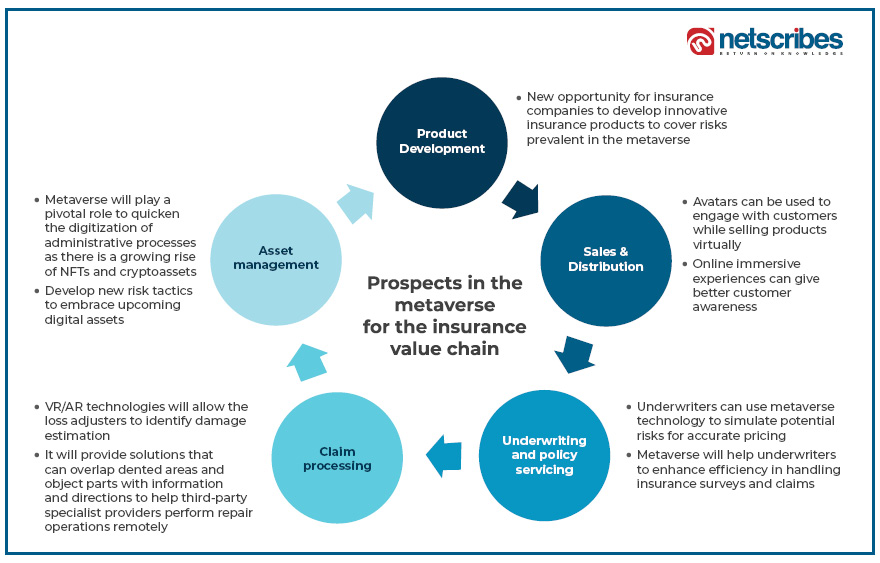Who ever imagined a virtual ‘white space’ where people can interact in computer-generated environments, objects, and scenarios, as well as other users, in real-time, would actually amount to something tangible beyond just the gaming reality? insurance products and commercial insurance to the digital marketplace. In simple terms, it means beyond the universe which could include a variety of technologies to create immersive content and experiences.
The metaverse is projected to be worth USD 13 trillion by 2030, which is double the value of the entire global insurance industry estimated at USD 5838 billion in 2022. The global metaverse market is expected to grow at a CAGR of 39.4% from 2022 to 2030. Thus, metaverse in insurance is a unique proposition that will help to lift expectations for how insurers interact with customers.
There are multiple opportunities for the insurance industry to engage with the metaverse and Web3-based technologies, such as smart contracts, which can help to improve the efficiency of statistical insurance products and speed up the online claim filing and Defi lending process, providing insurers with new investment options.
According to James Kruger, vice president, and head of Insurance UK at Capgemini, “the metaverse is indeed an opportunity to bring more innovation to the insurance industry. The insurance industry has generally been a laggard in the adoption of new technologies, leading to a gap in customer expectations. The metaverse can offer creative ways to educate, advise customers through gamification and give them a curated experience,” he said.
In this article, we assess the business opportunities that the growing popularity of the metaverse could bring to the insurance value chain, as well as the varied applications and use cases of a metaverse in insurance.
The metaverse would compel insurers to think beyond traditional products and services in order to effectively meet the needs of people using them. The insurance sector should work with manufacturers to encourage the responsible advancement of new technologies and solutions. Brokers will want to build a strategy of how they transfer their activities over to the virtual world so that their enterprise is consistent with the impending virtual reality. Designing a virtual analogy of an insurance product could be the first step towards selling insurance as a product compared to a service in the metaverse.

Following are some of the key applications of a metaverse in insurance processes to enhance its performance:
- Insurance claims: Metaverse headsets could be used to carry out estate evaluations by covering new damage data over pre-damage pictures to confirm claims evidence
- Underwriters: Property and casualty underwriters can apply the new technology to analyze resources without needing to be on-site, thereby lowering expenses
- Brokers: Brokers could examine a client’s risk profile and needs in a virtual interpretation of their premises. They could use this data to create risk management approaches, which they could then apply to real-world properties
- Insurance product developers: Developers of innovative insurance policies (such as Seguro GO, which was developed for Pokémon Go players) which focus on specific demographics could help insurers reach a new group of customers
- Loss adjusters: Training using new VR/VR technologies could enable agents, adjusters, and risk assessors to develop abilities wherever they are based, reducing the reliance on the availability of experts as well as decreasing administration costs
Some recent examples of the use of metaverse in insurance companies are as follows:
- Heungkuk Life Insurance introduces innovative digital products for the MZ generation
Heungkuk Life Insurance is the first company to join the Korean metaverse alliance where they aim to automate tasks using robotic process automation (RPA) which will allow clients to use an avatar and work in a 3D environment. Customers can visit life insurance agencies through these virtual reality headsets
- Max Life is syncing metaverse capabilities to better communicate with their remote talent
The firm is trying to amalgamate metaverse from the perspective of their employees to give them a better experience of their head offices while working remotely from their home
- Allianz adopts AR and VR technologies
Allianz has adopted the capabilities of AR and VR technologies to increase customer awareness about various dangers they may face at their home and provide insurance services for them. The clients can view any hidden dangers at home such as sink floods, smoking toasters, and water pipe breakage through their camera-enabled smartphones
- AXA Hong Kong partnered with The Sandbox to enter the metaverse
The Sandbox is a decentralized gaming virtual world that would help to bring immersive experiences around sustainability, wellness, and healthcare for AXA’s clients
- UnitedHealth launched a virtual-first health plan
UnitedHealth launched NavigateNOW, a virtual-first health plan that offers a unified approach to providing care both virtually and in person. This will include various types of care such as wellness, routine, chronic condition management, and urgent and behavioral health services.
The above success stories clearly show that insurance companies are keen to be a part of the metaverse and further explore it to their advantage. However, the inherent instability of digital assets makes it complicated for traditional insurers to fully comprehend the consequences associated with providing ad-hoc policies. The insurers also lack transparency as there is no standard legal framework that governs it.
Read More: Top 5 Insurance trends to watch out for in 2023
Though the metaverse is currently modestly sized it has big ambitions. The current boom in the metaverse makes it necessary for insurers to participate in the metaverse story. They need to build contracts that would protect them from image-related damage and at the same time engage with tech-savvy Gen Y & Z customers. Insurance companies need to develop corresponding systems that they can ultimately use to transmit their daily events to the virtual world.
Devising immersive user experiences and simplifying digital processes will also help insurers and their customers thrive in the upcoming digital future. To find out how Netscribes can help you with the technology research and market insights leverage you need over your competitors, contact us.






